Taiwan and Thailand yesterday signed a memorandum of understanding (MOU) to cooperate on validating artificial intelligence (AI) medical models, aiming to accelerate the commercialization of smart healthcare technologies, Taiwan’s Ministry of Health and Welfare said.
The MOU, signed by the ministry’s Department of Information Management and Thailand’s Mahidol University, marks Taiwan’s first external AI validation mechanism and a pioneering global step in medical AI certification.
Under the agreement, Mahidol University will recommend AI medical models for testing at selected Taiwanese hospitals, while Taiwanese hospitals will partner with Mahidol’s affiliated hospitals to establish pilot validation sites in Thailand.

Photo courtesy of the Ministry of Health and Welfare
AI systems developed in either country can undergo paid testing at both locations, with terms jointly determined, according to the MOU.
The initiative will be supported by the ministry’s federated learning platform, which connects four clinical AI validation centers in Taiwan. By using federated learning, institutions can train models without exchanging raw patient data, reducing privacy risks while improving model reliability and stability, the ministry said in a statement.
Federated learning is a way to train AI models without anyone having access to an individual’s data, offering a way to unlock information and feed new AI applications.
Since 2024, the ministry has funded four validation centers with databases that meet international standards and established a federated learning platform. These resources give developers and researchers access to larger, population- specific datasets, helping improve the quality and applicability of medical AI systems.
The ministry said the partnership addresses key validation challenges and advances Taiwan’s goal of becoming a global innovation hub for smart healthcare.

The manufacture of the remaining 28 M1A2T Abrams tanks Taiwan purchased from the US has recently been completed, and they are expected to be delivered within the next one to two months, a source said yesterday. The Ministry of National Defense is arranging cargo ships to transport the tanks to Taiwan as soon as possible, said the source, who is familiar with the matter. The estimated arrival time ranges from late this month to early next month, the source said. The 28 Abrams tanks make up the third and final batch of a total of 108 tanks, valued at about NT$40.5 billion

Travel agencies in Taiwan are working to secure alternative flights for travelers bound for New Zealand for the Lunar New Year holiday, as Air New Zealand workers are set to strike next week. The airline said that it has confirmed that the planned industrial action by its international wide-body cabin crew would go ahead on Thursday and Friday next week. While the Auckland-based carrier pledged to take reasonable measures to mitigate the impact of the workers’ strike, an Air New Zealand flight arriving at Taipei from Auckland on Thursday and another flight departing from Taipei for Auckland on Saturday would have to

A group from the Taiwanese Designers in Australia association yesterday represented Taiwan at the Midsumma Pride March in Melbourne. The march, held in the St. Kilda suburb, is the city’s largest LGBTQIA+ parade and the flagship event of the annual Midsumma Festival. It attracted more than 45,000 spectators who supported the 400 groups and 10,000 marchers that participated this year, the association said. Taiwanese Designers said they organized a team to march for Taiwan this year, joining politicians, government agencies, professionals and community organizations in showing support for LGBTQIA+ people and diverse communities. As the first country in Asia to legalize same-sex

MOTIVES QUESTIONED The PLA considers Xi’s policies toward Taiwan to be driven by personal considerations rather than military assessment, the Epoch Times reports Chinese President Xi Jinping’s (習近平) latest purge of the Chinese People’s Liberation Army (PLA) leadership might have been prompted by the military’s opposition to plans of invading Taiwan, the Epoch Times said. The Chinese military opposes waging war against Taiwan by a large consensus, putting it at odds with Xi’s vision, the Falun Gong-affiliated daily said in a report on Thursday, citing anonymous sources with insight into the PLA’s inner workings. The opposition is not the opinion of a few generals, but a widely shared view among the PLA cadre, the Epoch Times cited them as saying. “Chinese forces know full well that